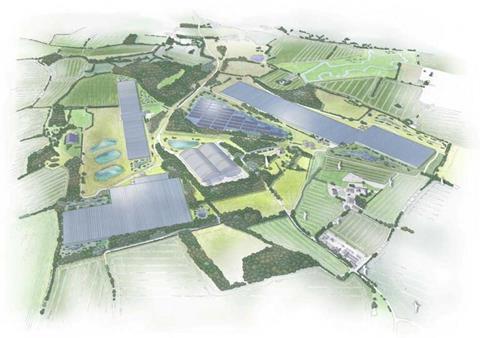A 40-hectare low carbon series of glasshouses in Essex is out for consultation as developers say it will provide climate resilient tomato production and replace imports from Holland, Morocco and Spain
A new 40-hectare glasshouse development in Essex that is designed to produce almost 30,000 tonnes of tomatoes a year has entered planning stages.

Rivenhall Greenhouse, near Braintree, will include a vertical farm in a nearby former RAF hangar, and is expected to displace 7.1 per cent of current tomato imports from countries including Spain, Morocco and Holland.
Its vertical farm will produce 375 tonnes of leafy greens in a former RAF Rivenhall hangar, according to documents.
Described as low carbon and with a ‘unique’ location on a former quarry, the site will use waste heat and CO2 from a new waste management facility due to be constructed nearby. It is being developed by low carbon greenhouse firm Oasthouse Ventures, which has already built around 70 acres of low carbon greenhouse in East Anglia in partnership with water company Anglian Water.
The firm sees sustainable UK production as a counter to the threat of climate change in southern Europe, which is affecting cost of production due to water shortages and droughts, as well as a security against gas price spikes affecting Dutch greenhouse production.
Once operational, Rivenhall is expecting to spend around £600,000 per year with local agriculture supply businesses and provide 420 full-time jobs and 80 part time jobs to the local area.
With planning applications have been submitted to Essex County Council, the development is being described as an “operational blueprint” for Essex County Council and Braintree District Council’s respective climate change strategies.
The site was chosen for its proximity to waste firm Indaver and Wren Renewables, as well as the high levels of sunshine in the area. According to the development brochure, Braintree receives 1,611 hours of sunshine annually, compared to the Dutch horticultural areas of the ‘Westland’, which receives 1,624 hours annually.
The application is now out for consultation until the closing date of 1 June.



